English Words in Action, Group S
(a variety of English words which have developed through history and are currently used in our modern age)
Simply click on this banner (or the following link) and you will be on your way to stimulate your brain for greater word comprehension with quizzes based on some of the words in this unit.
2. Situations in which people encounter an unexpected and excessive supply of something: When there are too many books, robberies, celebrity break-ups, or corporate mergers; obviously all kinds of spates are going on.
3.Etymology: although it is now used to describe a large number or an unusually large amount of something, it originally described a sudden flood of water; such as, a river overflowing after a strong downpour of rain.
Half of the 12,000 kilometers of autobahns already have speed limits as do smaller roads; however, the "anything-goes" stretches of the autobahn are the fastest public roads in the world.
Germany has a significant economic incentive to resist a speed limit because it builds some of the world's fastest cars, and the autobahn is a valuable showcase and marketing tool for the industry.
2. To constitute the letters of a word: These letters spell "zebra".
2. A verbal presentation that someone has often said before and which is usually done to convince people to make the best choice, agree to something, etc.: Janet listened to the politician's spiel about who would be the best mayor of her city and so she was thinking about voting for him.
Henry gave Margaret a long spiel about the benefits of going to the fitness studio for exercises to improve her physical condition.
3. Etymology: from German spielen "to play" related to Old English spilian, "to revel".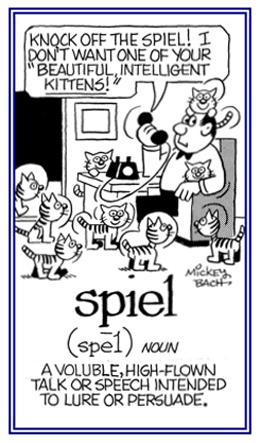
Go to this Word A Day Revisited Index
George and Tina splurged part of their financial savings on an expensive trip to Europe.
2. Etymology: of uncertain origin.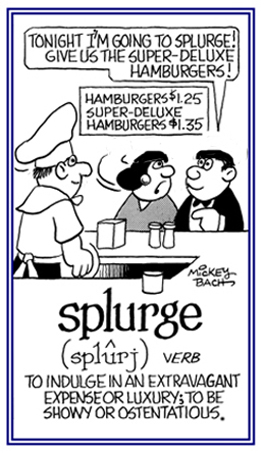
Go to this Word A Day Revisited Index
so you can see more of Mickey Bach's cartoons.
2. To play a trick on or to deceive someone or other people: Mark Twain once spoofed his friends by saying: "It usually takes more than three weeks to prepare a good impromptu speech."
Jack was spoofing his fellow students about the contrary meanings of words that the teacher had assigned to them to learn; a few examples included the following:
- A tightrope walker is a well-balanced person who always takes the straight and narrow path.
- A toaster is a kitchen appliance that rings a bell when the toast is done or sends up smoke signals.
- Travel is a form of education that broadens the mind, flattens the wallet, and lengthens the conversation.
- A train is the only thing whose tracks people can see even before it has passed by.

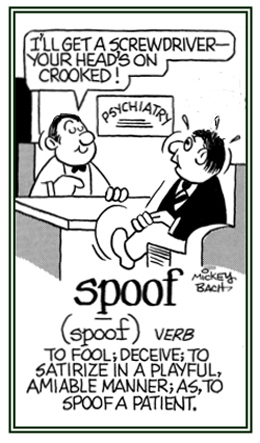
Go to this Word A Day Revisited Index
so you can see more of Mickey Bach's cartoons.
2. Relating to a person or an animal being very excitable or skittish: A dog that gets scared at everything, even its own shadow, is an example of a spooky creature.
A spooky horse is easily startled and will jump and run away.
3. Etymology: from Dutch spook, "ghost, specter."
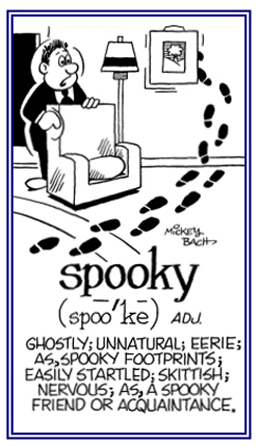
Go to this Word A Day Revisited Index
so you can see more of Mickey Bach's cartoons.
The two criminals went on a robbing spree of two banks before they were apprehended by the police.
If anyone spends a certain amount of time doing something in an unrestrained way, then it is proper to say that he or she is on a spree.
2. Etymology: of unknown origin.
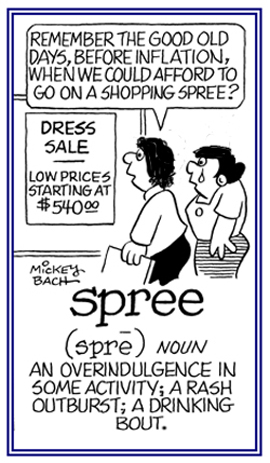
Go to this Word A Day Revisited Index
so you can see more of Mickey Bach's cartoons.
2. Etymology: from Gaelic spong, "tinder, pith, sponge"; borrowed from Latin spongia, "sponge."
Before it meant spunk or "courage", it had the meaning of "tender" or "wood" used in lighting a fire."
It comes from Irish sponnc, "tinder."
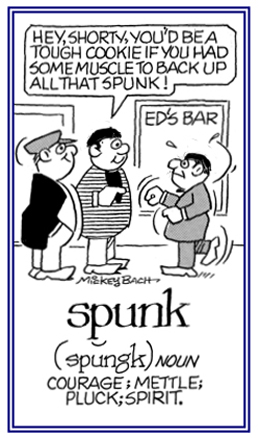
Go to this Word A Day Revisited Index
so you can see more of Mickey Bach's cartoons.
2. Based on false ideas or bad reasoning: Shelby made a spurious claim to her health insurance for medication that she never used or needed.
3. In botany, that which is similar in appearance but different in structure or function: There are some spurious parts of plants that superficially resemble those of other plants, but they are not the same.
4. Etymology: from Latin spurius, "false, illegitimate".
The sense of having an illegitimate or being of an invald origin, not properly qualified or constituted, is recorded first in Ben Jonson's 1601 The Poetaster and the extended sense of "false, sham, counterfeit" appeared in 1615.
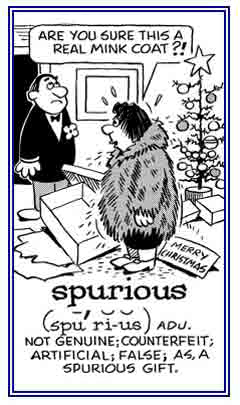
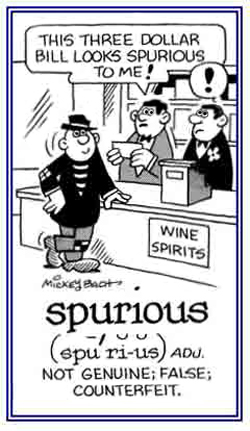
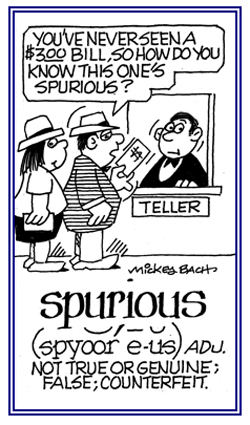
Go to this Word A Day Revisited Index
so you can see more of Mickey Bach's cartoons.
The customer spuriously tried to use counterfeit money to pay for his purchases.
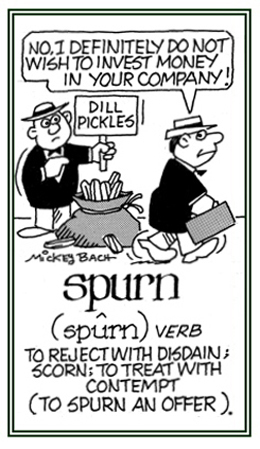
Go to this Word A Day Revisited Index
so you can see more of Mickey Bach's cartoons.
2. Etymology: from a Scandinavian source, related to Swedish dialectal skvabbel, "to dispute, to quarrel."
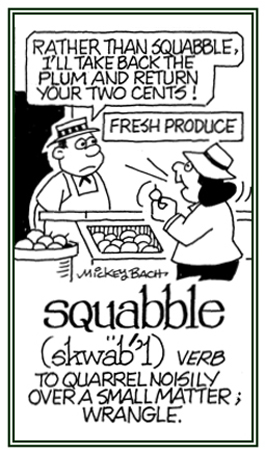
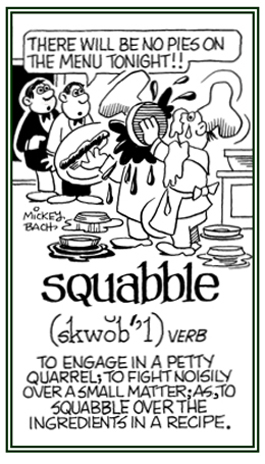
Go to this Word A Day Revisited Index
so you can see more of Mickey Bach's cartoons.
Links to all of the groups of English words in action, Groups A to Z.
You may see the bibliographic list of sources of information for these words in action.


